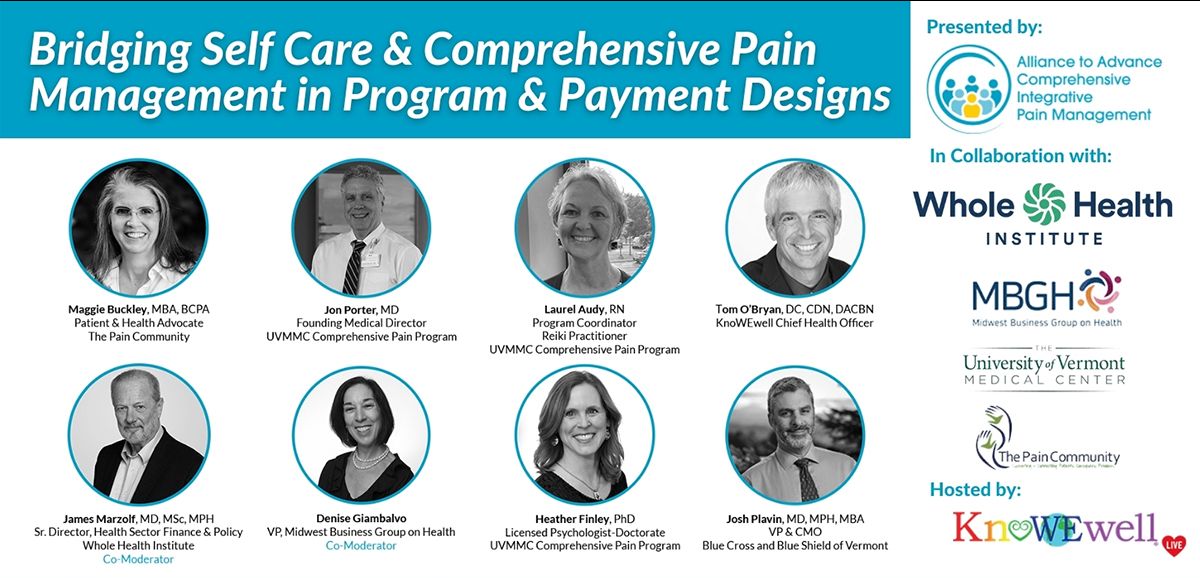AACIPM Issues Recommendations to CMS on Payment for Pain Care Services
 In response to a Centers for Medicare & Medicaid Services (CMS) proposed rule regarding changes to the 2022 Medicare Physician Fee Schedule, AACIPM submitted a letter to CMS outlining the healthcare settings and practitioners that furnish non-opioid pain management, the resources involved in treating chronic pain, and how CMS might design new codes that will better enable health providers to classify and treat pain. The letter, submitted on behalf of 26 individual signers and 8 organizations, aimed to highlight the many diverse practitioners and services that may make up a comprehensive integrative pain management treatment plan, and further, to highlight the issues that these providers face when attempting to bill CMS for the pain care services which they provide.
In response to a Centers for Medicare & Medicaid Services (CMS) proposed rule regarding changes to the 2022 Medicare Physician Fee Schedule, AACIPM submitted a letter to CMS outlining the healthcare settings and practitioners that furnish non-opioid pain management, the resources involved in treating chronic pain, and how CMS might design new codes that will better enable health providers to classify and treat pain. The letter, submitted on behalf of 26 individual signers and 8 organizations, aimed to highlight the many diverse practitioners and services that may make up a comprehensive integrative pain management treatment plan, and further, to highlight the issues that these providers face when attempting to bill CMS for the pain care services which they provide.
AACIPM issued five recommendations related to the creation of standalone pain codes, both time-based and value-based, and the need for CMS to ensure that clinicians are able to provide services “at the top of their license or certification” by eliminating unnecessary direct supervision requirements and providing reimbursement for the full range of evidence-based, guideline concordant services that they provide.
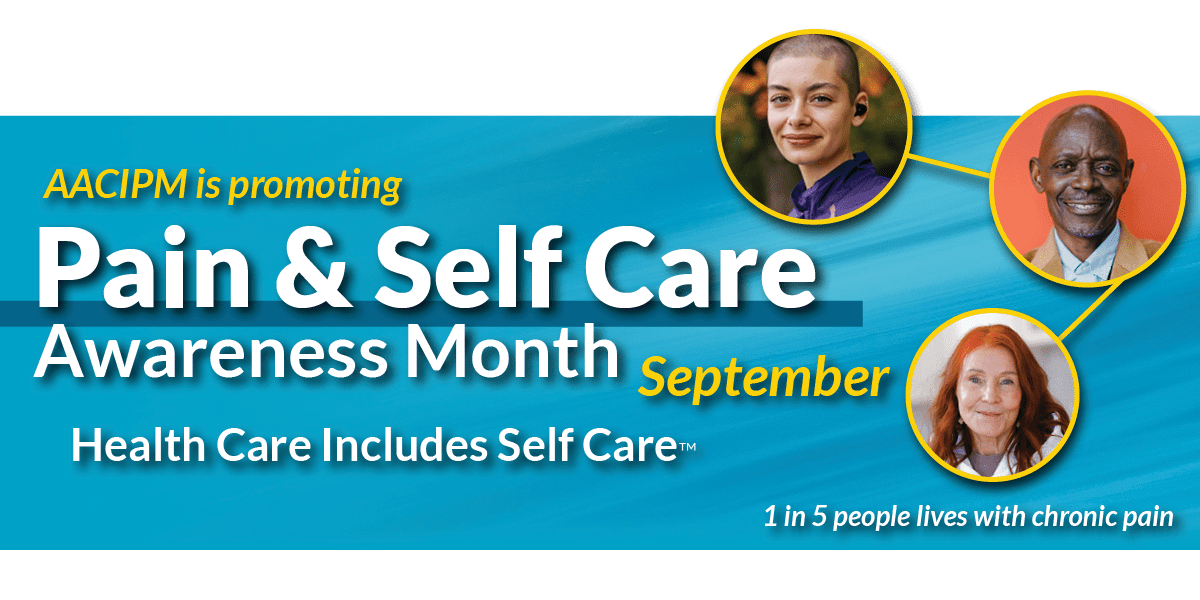
AACIPM Promotes Deeper Understanding During Pain & Self Care Awareness Month
In honor of Pain and Self Care Awareness Month, AACIPM spent the month of September collaborating with our partners to spread awareness and deepen connections and understanding regarding the intersection of these important issues.
Bridging Self Care and Comprehensive Pain Management in Program and Payment Designs, presented in collaboration with Whole Health Institute, Midwest Business Group on Health, The Pain Community and University of Vermont Medical Center, is a 90-minute webinar in which we explore payment design with leaders who represent people with pain, mid-to-large employers, the financial/return on investment side, and the team involved with one unique payer-provider partnership in Vermont, the UVMMC Comprehensive Pain Program. The webinar, hosted by KnoWEwell Live, was held on September 28th and the replay is available at the button below (it’s free and you need to register to watch).
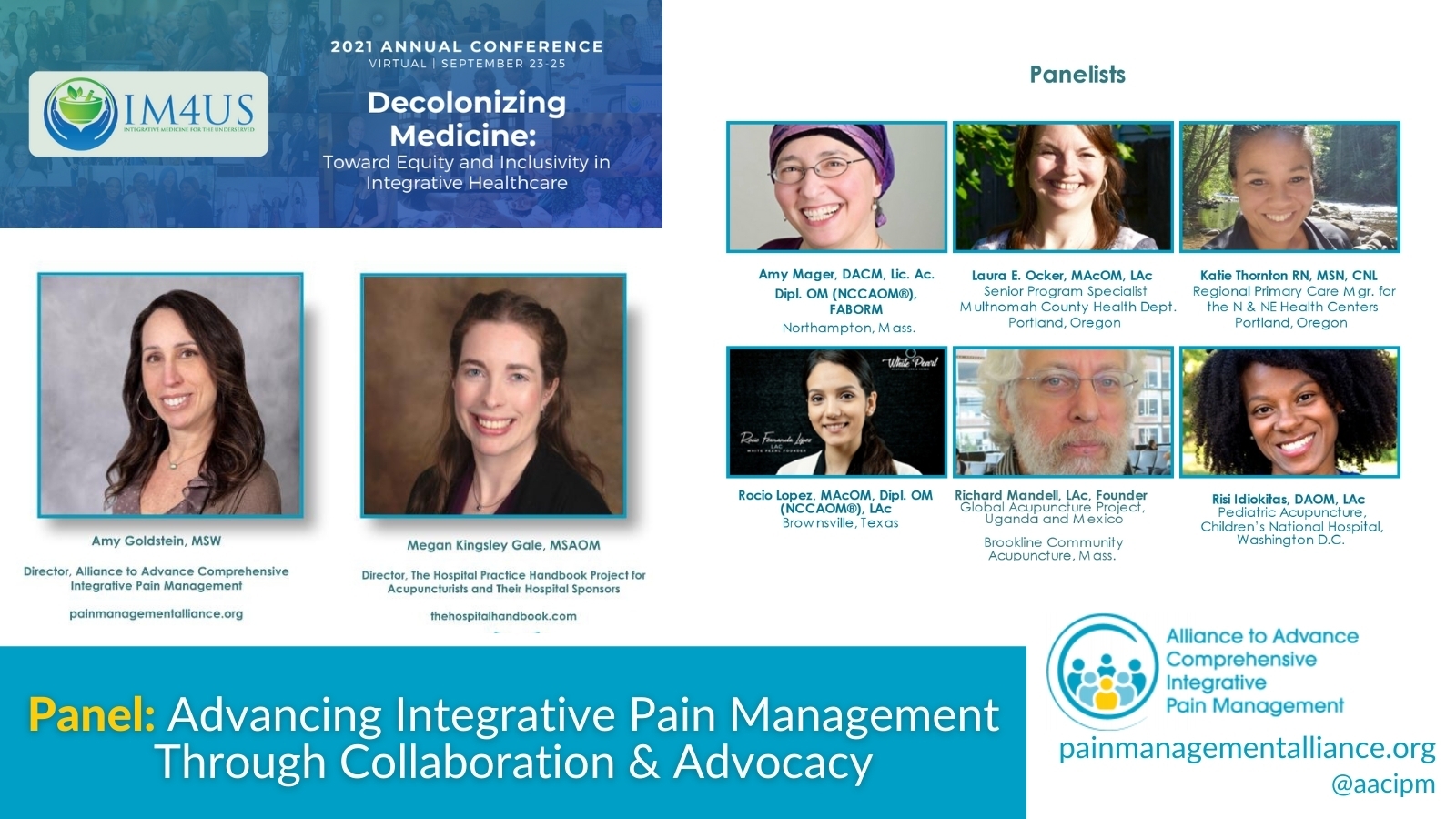
Decolonizing Medicine: Toward Equity and Inclusivity in Integrative Healthcare, IM4US’ 2021 Annual Conference, was held September 23rd-25th with the goal of building more equitable models of integrative healthcare.
With over 700 registrants for this conference and an extraordinary list of presenters, it exceeded expectations!
AACIPM was honored to participate in this virtual event via the panel presentation, Advancing Integrative Pain Management Through Collaboration and Advocacy. AACIPM Director Amy Goldstein, MSW, and Megan Kingsley Gale, MSAOM, Director, The Hospital Practice Handbook Project for Acupuncturists and Their Hospital Sponsors, co-moderated this panel that featured providers and leaders who are making remarkable differences in the lives of people who are underserved. These leaders – Rocio Lopez, LAc, Risi Idiokitas, DAOM, LAc, Laura Ocker, MAcOM, LAc, Katie Thornton, RN, MSN, CNL, Richard Mandell, LAc, and Amy Mager, DACM, LAc – represent an important range of practice settings, geographic areas, payment models, and patient populations.
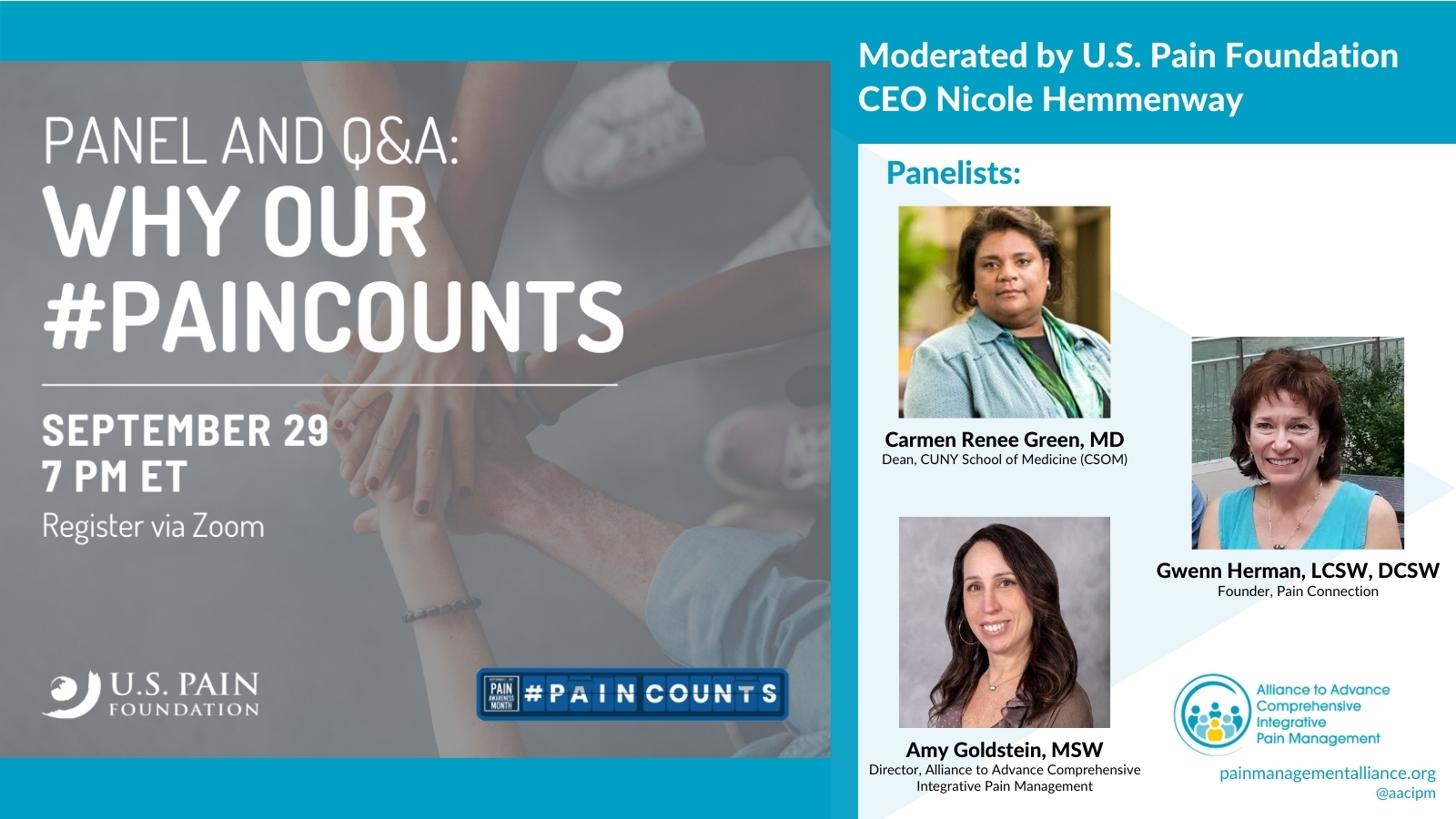
Why Our #PainCounts, held by U.S. Pain Foundation, brought together experts in the health care field and people with chronic pain to discuss critical issues surrounding pain management, highlighting what needs to change and how we can better support people with chronic pain.
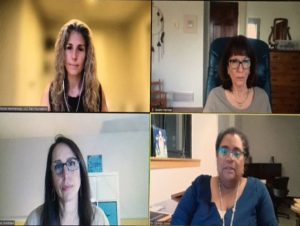 Panelists included:
Panelists included:
- Carmen Green, MD, Dean of CUNY School of Medicine at the City College of New York and national expert in addressing disparities in pain care. See Dr. Green’s inspiring intro, the Pain of Prejudice, for US Pain’s INvisible Project.
- Amy Goldstein, MSW, AACIPM Director who focused on synthesizing payor, provider and patient interests when it comes to access to multidisciplinary care; and
Gwenn Herman, LCSW, DCSW, a person living with pain who founded Pain Connection, a national network of chronic pain support groups, support leader trainings, and more.
Cindy Steinberg Receives AMTA’s 2021 President’s Award
 AACIPM would like to congratulate Cindy Steinberg of the U.S. Pain Foundation, an AACIPM partner, for being awarded the 2021 President’s Award from the American Massage Therapy Association (AMTA), another AACIPM partner. Awarded each year, the AMTA President’s Award honors a recipient who has contributed to the profession in an outstanding manner. Serving as the National Director of Policy and Advocacy for the U.S. Pain Foundation, the Policy Council Chair for the Massachusetts Pain Initiative, and on the Pain Management Best Practices Inter-Agency Task Force created by Congress, Cindy is unparalleled in her dedication to pain advocacy.
AACIPM would like to congratulate Cindy Steinberg of the U.S. Pain Foundation, an AACIPM partner, for being awarded the 2021 President’s Award from the American Massage Therapy Association (AMTA), another AACIPM partner. Awarded each year, the AMTA President’s Award honors a recipient who has contributed to the profession in an outstanding manner. Serving as the National Director of Policy and Advocacy for the U.S. Pain Foundation, the Policy Council Chair for the Massachusetts Pain Initiative, and on the Pain Management Best Practices Inter-Agency Task Force created by Congress, Cindy is unparalleled in her dedication to pain advocacy.
Changing the health paradigm to support comprehensive integrative pain management takes tireless advocacy efforts, and we at AACIPM value working with Cindy, AMTA, and all of our dedicated partners in change!
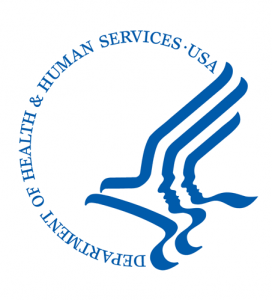 Updates from HHS
Updates from HHS
AHRQ Releases Systematic Review of Interventional Treatments for Acute and Chronic Pain
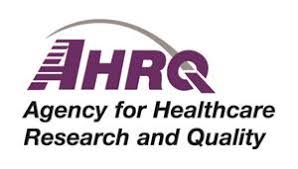 The Evidence-based Practice Center Program at the Agency for Healthcare Research and Quality (AHRQ) has completed and released their evidence review of interventional treatments for acute and chronic pain. The review found a number of treatments to be more effective than sham or usual care, including vertebroplasty, kyphoplasty, and cooled radiofrequency denervation. However, most evidence was limited and more research is needed to determine the benefits and harms of other interventional procedures addressed in the report.
The Evidence-based Practice Center Program at the Agency for Healthcare Research and Quality (AHRQ) has completed and released their evidence review of interventional treatments for acute and chronic pain. The review found a number of treatments to be more effective than sham or usual care, including vertebroplasty, kyphoplasty, and cooled radiofrequency denervation. However, most evidence was limited and more research is needed to determine the benefits and harms of other interventional procedures addressed in the report.
To improve the future evidence-base, reviewers recommend that future trials of interventional procedures should enroll older, Medicare-eligible populations, utilize sham controls, evaluate function as well as pain, include rigorous evaluation of harms, evaluate longer-term outcomes, and evaluate benefits and harms according to demographic, clinical, and technical factors.
NIH Study Shows Disparities in Opioid Overdose Deaths Underscore the Need for Racially Inclusive Solutions
![]() According to a new study by the National Institutes of Health, published in the American Journal of Public Health, non-Hispanic Black individuals experienced a 38% increase in the rate of opioid overdose deaths from 2018 to 2019, while the rates for other race and ethnicity groups held steady or decreased, emphasizing the need for equitable, data-driven, community-based interventions that address these disparities. The research was conducted as part of the HEALing Communities Study, which aims to significantly reduce opioid-related overdose deaths by helping communities implement evidence-based practices to treat opioid use disorder and reduce other harms associated with opioid use.
According to a new study by the National Institutes of Health, published in the American Journal of Public Health, non-Hispanic Black individuals experienced a 38% increase in the rate of opioid overdose deaths from 2018 to 2019, while the rates for other race and ethnicity groups held steady or decreased, emphasizing the need for equitable, data-driven, community-based interventions that address these disparities. The research was conducted as part of the HEALing Communities Study, which aims to significantly reduce opioid-related overdose deaths by helping communities implement evidence-based practices to treat opioid use disorder and reduce other harms associated with opioid use.
NAM Discussion Paper Urges Health Care Quality and Safety Initiatives to Focus on Health Equity
 A new discussion paper in NAM Perspectives, the digital periodical of the National Academy of Medicine, identifies health equity as the area of most urgent and cross-cutting concern for health care quality organizations. The paper outlines key barriers that are impeding progress toward health care equity, then offers a proposed agenda for centering equity in efforts moving forward, including: increasing patient trust and involvement; increasing community engagement; rewarding organizations for progress toward equity; improving data quality; and implementing new and improved measurement strategies.
A new discussion paper in NAM Perspectives, the digital periodical of the National Academy of Medicine, identifies health equity as the area of most urgent and cross-cutting concern for health care quality organizations. The paper outlines key barriers that are impeding progress toward health care equity, then offers a proposed agenda for centering equity in efforts moving forward, including: increasing patient trust and involvement; increasing community engagement; rewarding organizations for progress toward equity; improving data quality; and implementing new and improved measurement strategies.
Educational Opportunities
 Methodology for Cost-Effectiveness Analysis of a Pain-Focused Brief Intervention: Emphasis on pain-related costs
Methodology for Cost-Effectiveness Analysis of a Pain-Focused Brief Intervention: Emphasis on pain-related costs
The U.S. Department of Veterans Affairs will hold a call on October 5th, 11:00am-12:00pm EST, to discuss methods of determining the cost-effectiveness of certain pain-focused interventions. The intended audience for this call includes researchers, clinicians, operations staff, veterans, and the general public. Speakers include Christina Lazar, MPH, Kate Gilstad-Hayden, PhD, and Paul Barnett, PhD.
To join this call, please send your name and email address to: cyberseminar@va.gov.
Physical Therapy Orthopedic Residency Program
With funding provided by the Veteran’s Health Administration’s Office of Academic Affiliations, the Durham VA Health Care System Physical Therapy Orthopaedic Residency Program is a 12-month comprehensive clinical care residency experience that is coordinated through one-on-one patient care rotations in the outpatient and inpatient settings. The program’s structured rotations are designed to maximize exposure to a broad range of orthopedic diagnoses. Further, the program is proud to be on the forefront of telehealth care, successfully integrating telehealth into their outpatient care model since the 2020 academic year.
The program integrates Lab and Lectureship involvement opportunities in both Duke University and Campbell University’s DPT program musculoskeletal curriculum, continuous rotations of Research Project Initiatives at Womack Army Medical Center offering research opportunities off site, and numerous specialty clinic observational opportunities.

Psychophysiologic Disorders Association Conference
From October 28-30, the Psychophysiologic Disorders Association will feature twenty-two experts who will share their experiences in reducing chronic pain, functional syndromes and medically unexplained symptoms (collectively referred to as Psychophysiologic Disorders) through an evidence-based, biopsychosocial approach. The conference will include nine hours of on-demand presentations and three, live Zoom Q&A panels.
Attendees will have access to the full conference on-demand for one year and may earn up to 12 CE/CME hours for their attendance.
Message from the Director
 As September is closing, I am full of gratitude, respect and humility as I think about all the dedicated people who are actively doing something today, to improve access to whole person, comprehensive pain care for everyone. Each unique contribution is part of the larger and shared movement necessary to change the practice and policy paradigm.
As September is closing, I am full of gratitude, respect and humility as I think about all the dedicated people who are actively doing something today, to improve access to whole person, comprehensive pain care for everyone. Each unique contribution is part of the larger and shared movement necessary to change the practice and policy paradigm.
During this Awareness Month for Pain, Self Care and Suicide Prevention – we worked to connect more dots around these intersections in order to share practical information for and with people with pain, providers, payors, purchasers, and policymakers. I strongly encourage you to glance through this newsletter and read about other stakeholders that share your end-goal – to improve the lives of people with pain by providing evidence-informed, individualized, whole person, culturally sensitive, trauma-informed, multimodal, multidisciplinary care.
I’m positive we all have something new to learn if we allow ourselves to talk together and listen. I most certainly learned new things this month during our CMS-related discussions and while listening during three panels just this past week (IM4US, AACIPM Webinar, US Pain Foundation). I hope you can create a few minutes of space to expand your thoughts about person-centered pain care and how we can collaborate to improve access for everyone.
Onward and Upward!
Amy
Relevant Reading
![]()
Ashar YK, Gordon A, Schubiner H, et al. Effect of Pain Reprocessing Therapy vs Placebo and Usual Care for Patients With Chronic Back Pain: A Randomized Clinical Trial. JAMA Psychiatry. Published online September 29, 2021. doi:10.1001/jamapsychiatry.2021.2669
Possible Neuropathic Pain in Patients with Osteoarthritis of the Knee Before and After Total Knee Arthroplasty, Dovepress, September 23
Chronic pain program collaboration between Blue Cross and UVM Medical Center outcomes recognized, Press Release, September 22
Report shows decreases in opioid prescribing, increase in overdoses, American Medical Association, September 21
Accendowave: Benchmarking Pain Data with Machine Learning Technology, UCSF 2021 Health Award Quarterfinalist
Issue Brief: Nation’s drug-related overdose and death epidemic continues to worsen, American Medical Association, September 20
Issue brief: Reports of efforts to help the nation’s overdose epidemic, American Medical Association, September 20
Video: The US Pain Foundation Sets September Initiative for Awareness with #PainCounts, HCP Live, September 17
Researchers assess the effectiveness of short-term online meditation courses, Medical Xpress, September 16
How I Learned To Live With and Manage Chronic Pain, Pain News Network, September 13
Infighting in the Pain Community Made Me Leave Advocacy, Pain News Network, September 10
Guideline: Evidence-Based Best Practices for the Management of Cancer-Related Pain, Clinical Pain Advisor, September 9
September Marks Sickle Cell Disease Awareness Month in Texas, HHS – Texas, September 9
4 Women Open Up About Living With Chronic Pain, Marie Claire, September 7
‘Innovative’ Equine Therapy Helps Overcome PTSD Symptoms, Medscape, September 2
Treating Chronic Pain Is Good for Your Brain, Bel Marra Health, August 31
Pain and Opioid Use: Evidence for Integrating Acupuncture Into Treatment Planning, Global Advances in Health and Medicine, August 24
Back and neck pain: in support of routine delivery of non-pharmacologic treatments as a way to improve individual and population health, HHS Public Access, August 5
Feedback
We welcome your input! What do you like? Do you have a contribution for an upcoming newsletter? Send us your comments, suggestions, or contributions.
